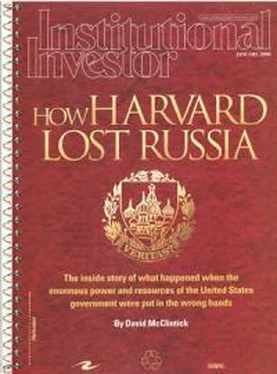Shleifer and Zimmerman declined through their lawyer to be interviewed directly. The magazine was unable to reach Hay. Hebert, responding in an e-mail, asked that the author not contact her in the future.
The reformers' report card
How much did the scandal involving the Harvard Institute for International Development harm Russia?
It's easy to exaggerate the extent of U.S. influence. A glance at Iraq underscores how difficult it is for Washington to effect fundamental change in other countries: One can make the case that reforming Russia was more critical to the world -- and more challenging. Sowing the seeds of shareholder capitalism in a country with an authoritarian history and no experience of free markets for seven decades was going to be an uphill task even for the elite of the premier U.S. academic institution.
Notwithstanding those constraints, however, Harvard University was in a unique position to exert a powerful influence. Post-Soviet Russia turned to the West for help in rebuilding its economy and filling the vacuum left by communism's fall. In running Harvard's Russia Project, Andrei Shleifer and Jonathan Hay had an opportunity to preach the importance of integrity, transparency and fairness in shaping a business culture, and to work to enshrine those values in the country's legal and financial infrastructure. Instead, their personal dealings sent a very different message.
"The defendants' actions undercut the fundamental purpose of the United States' program in Russia -- the creation of trust and confidence in the emerging Russian financial markets and the promotion of openness, transparency, the rule of law, and fair play in the development of the Russian economy and laws," the Justice Department asserted in its initial complaint in U.S. v. Harvard, Shleifer, Hay, et al. on September 26, 2000.
Janet Ballantyne, a veteran officer for the U.S. Agency for International Development, who headed AID's Moscow office when the scandal broke, echoed that view in her testimony in the lawsuit brought by the U.S government.
The Harvard advisers "had access to the highest levels of government," she said. "What should have happened . . . as Russians become acquainted with the way American institutions work, [was] that they [would] learn the transparency and the conflict of interest values that we also expect of our own officials. I think that the damage to the United States' relations with Russia was very great."
The collapse of the Harvard project arrested work on a number of vital reform projects. At the Institute for Law-Based Economy, some planned legislation was never finished. The Resource Secretariat's effort to design a central clearinghouse was halted, and Russia to this day lacks a fully realized central clearing facility capable of handling both securities and cash, a gap that has hampered the development of the domestic securities market.
"This scandal hobbled the development of the Russian capital market infrastructure for a substantial period of time," says Bruce Lawrence, a Credit Suisse First Boston executive in Moscow at the time. In A Normal Country: Russia after Communism, his 2005 book on Russia, even Shleifer acknowledged that "[i]nvestor protection and corporate governance in Russia remain weak."
The Harvard scandal also undermined Dmitri Vasiliev and the fledgling Russian Securities and Exchange Commission that he headed. The commission was one of the few executive agencies fully controlled by free-market reformers, and Vasiliev waged a lonely battle against communist-era factory managers known as "Red directors," budding oligarchs and conservative government bureaucrats in trying to establish rules for a modern financial market. The scandal tarnished Vasiliev's reputation, weakening him politically. Eventually, the RSEC was demoted from an independent agency to a department of the prime minister's office.
"It was the start of what we call the dark times," says Igor Moryakov, president of the Depository Clearing Co. "People who really understood . . . how to operate the market were dismissed. New people, without any experience, without any understanding of how markets work, came to power. It was an absolutely huge disappointment."
Vasiliev had been virtually the only senior official to oppose the Yeltsin government's overreliance on the domestic bond market, calling it effectively a pyramid scheme. Russia defaulted on more than $40 billion worth of domestic debt in August 1998, triggering a financial tremor felt around the globe.
"The scandal caused an extreme decline in the Russian SEC's influence as a regulator," says economist Alexander Abramov, head of development at the Moscow-based Russian Trading System, the country's principal stock exchange, and the author of a new book on Russia's securities markets. "It made the financial crisis of 1998 more likely. And I think it destroyed the trust and relationships between Russian authorities and American advisers."
The Harvard program can claim some successes. HIID advisers did help create Russia's main stock exchange, the RTS, and worked with the RSEC to establish a Web site and public information service, the first of its kind set up by a Russian agency. -- D.McC.
Where are they now?
Richard Bernardis the executive vice president and general counsel of the New York Stock Exchange;
Anatoly Chubaisis CEO of UES of Russia, the country's biggest power company. He survived an assassination attempt on the streets of Moscow in April 2005;
Yegor Gaidarruns the Institute for the Economy in Transition, a prominent Moscow think tank;
Jonathan Haymarried Elizabeth Hebert following the end of the Harvard Russia Project; he is an associate in the London office of Cleary Gottlieb Steen & Hamilton and is currently on leave;
Elizabeth Hebertleft Pallada Asset Management in the fall of 2005. The firm was sold to State Street Global Advisors in 1998; in 2005, according to Russian media reports, State Street sold Pallada to a Moscow entity called Russian Funds Investment Group;
Holly Nielsenis international counsel and co-head of the Russian practice at Debevoise & Plimpton in Moscow;
Andrea Rutherfordlives in Massachusetts, where she moved in 2004 after five years as a managing director at Brunswick UBS in Moscow;
Jeffrey Sachsdirects the Earth Institute at Columbia University and is a special adviser to United Nations Secretary General Kofi Annan;
Andrei Shleiferteaches economics as a tenured professor at Harvard. He is on leave for the current academic year. He travels the world, publishes voluminously and is widely cited as an expert in a variety of economic specialties;
Dmitri Vasilievis first deputy general director for strategy and corporate policy at the Russian power conglomerate Mosenergo;
Julia Zagachinruns the First Specialized Depository (formerly the First Russian Specialized Depository) in Moscow. She was a cooperating witness in the case of U.S. v. Harvard, Shleifer, Hay, et al, having invoked the Fifth Amendment and been granted immunity from prosecution before her grand jury testimony;
Nancy Zimmermanruns Bracebridge Capital, in Cambridge, across Massachusetts Avenue from Harvard Yard. -- D.McC.
How Harvard Deep-Sixed Its Russian Scandal
by David Warsh
March 4, 2011
https://www.counterpunch.org/2011/03/04/how-harvard-deep-sixed-its-russian-scandal/
I’m always interested to see a new book on the transition of the Russian economy from central planning to the oil-based siloviki-dominated oligarchy of today. No Precedent, No Plan, by Martin Gilman, stakes a claim to being the definitive word on some of those events. The impact of the crash of August 1998 needs to be appreciated in order to understand contemporary Russia, he says. The English edition is a slimmed-down version of a longer Russian book.
Читать дальше






![Джонатан Димблби - Barbarossa - How Hitler Lost the War [calibre]](/books/385421/dzhonatan-dimblbi-barbarossa-how-hitler-lost-the-w-thumb.webp)





